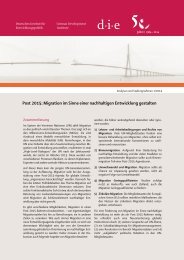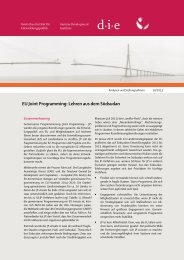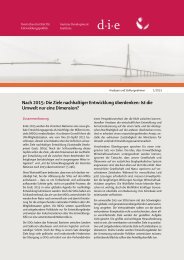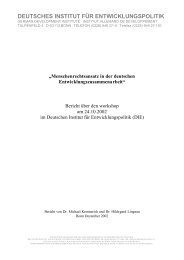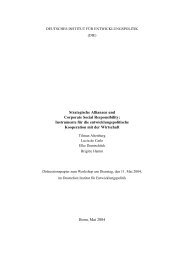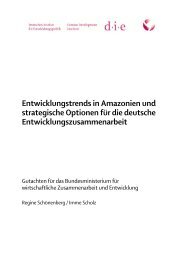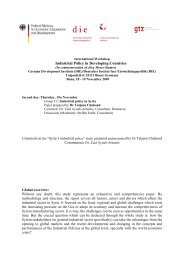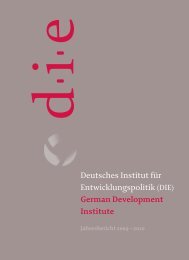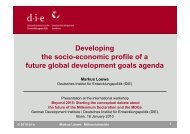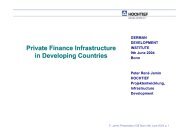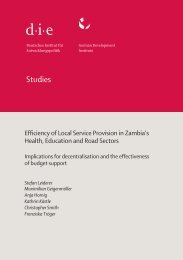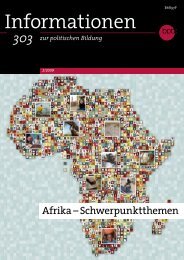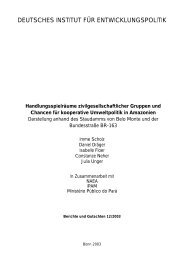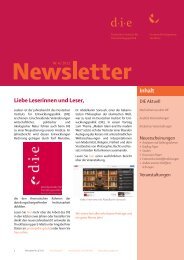Middle East / North Africa and the Millennium Development Goals ...
Middle East / North Africa and the Millennium Development Goals ...
Middle East / North Africa and the Millennium Development Goals ...
You also want an ePaper? Increase the reach of your titles
YUMPU automatically turns print PDFs into web optimized ePapers that Google loves.
<strong>Middle</strong> <strong>East</strong> / <strong>North</strong> <strong>Africa</strong> <strong>and</strong> <strong>the</strong> <strong>Millennium</strong> <strong>Development</strong> <strong>Goals</strong><br />
financial system. However, if <strong>the</strong> developing countries are to benefit from<br />
such a system, <strong>the</strong>ir own trading <strong>and</strong> financial systems will also be open,<br />
rule-based, predictable, <strong>and</strong> nondiscriminatory.<br />
Many of <strong>the</strong> countries in <strong>the</strong> MENA region are far removed from meeting<br />
this condition. Their financial <strong>and</strong> product markets are clearly overregulated<br />
<strong>and</strong> protected against potential market entrants by legal regulations<br />
<strong>and</strong> informal barriers. The actors affected by this include both foreign suppliers<br />
<strong>and</strong> potential competitors of established domestic firms. Anyone interested<br />
in investing or producing goods in <strong>the</strong>se countries must be prepared<br />
to submit to protracted, complicated, <strong>and</strong> cumbersome approval<br />
processes that entail high costs <strong>and</strong> risks. Until <strong>the</strong> end of <strong>the</strong> process it is<br />
impossible to predict whe<strong>the</strong>r or not an application will be approved. And<br />
even <strong>the</strong>n, new stumbling blocks may turn up or be placed in <strong>the</strong> path of<br />
an investor (Loewe et al. 2006; UN 2004a, 33). In addition, intellectual<br />
property rights are not adequately protected. Competition laws are ei<strong>the</strong>r<br />
weak or simply ignored – assuming that <strong>the</strong>re are any in <strong>the</strong> first place. In<br />
legal disputes it is difficult to predict how courts will decide, i.e. whe<strong>the</strong>r<br />
<strong>the</strong>y will apply <strong>the</strong> law <strong>and</strong> in what ways <strong>the</strong>y may interpret <strong>the</strong>m. All this<br />
means uncertainty <strong>and</strong> high transaction costs. The result is that in many<br />
MENA countries hardly any investments are made in productive capital<br />
assets. Savings are invested almost exclusively in real estate or financial<br />
capital, or <strong>the</strong>y are moved abroad (Bennet 2003; World Bank 2003).<br />
The main beneficiaries of <strong>the</strong>se opaque bureaucratic structures are a small<br />
group of persons with good connections to political decision-makers. Most<br />
applicants are simply unable to predict whe<strong>the</strong>r or not <strong>the</strong> administrations<br />
responsible will approve <strong>the</strong>ir applications. Decisions often depend to a<br />
very large extent on an applicant’s situation, social status, <strong>and</strong> personal<br />
connections (GTZ 2003, 4; Loewe et al. 2006).<br />
In view of <strong>the</strong> fact that within <strong>the</strong> authoritarian context given in <strong>the</strong><br />
MENA countries, all political institutions are dependent on centers of<br />
power, <strong>the</strong>re is no instance that could review whe<strong>the</strong>r nor not decisions are<br />
in conformity with given rules, or indeed that could correct <strong>and</strong> penalize<br />
infractions of <strong>the</strong>se rules. Corruption is widespread, political <strong>and</strong> legal decision-making<br />
processes are cumbersome, <strong>and</strong> economic actors are unable<br />
to rely even on written legal norms (Loewe et al. 2006). The Arab Human<br />
<strong>Development</strong> Reports point in unmistakable language to <strong>the</strong>se governance<br />
deficits (UNDP / AFESD 2002; UNDP /AFESD 2004).<br />
German <strong>Development</strong> Institute 89



